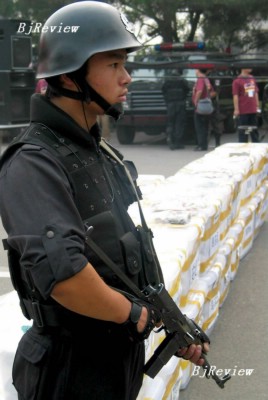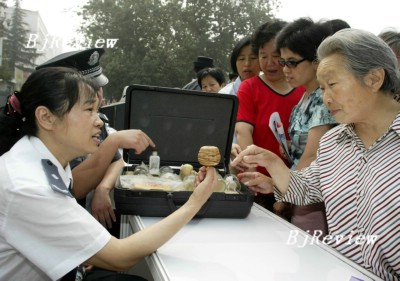|
 After a six-month crackdown on drug-related crimes in the city's entertainment venues, the Beijing Narcotics Control Commission declared in late December that it had cleared up 1,300 sites. The commission also said Beijing has set a goal of eradicating drugs in all public places and promoting drug-free communities in time for the Olympics in 2008. After a six-month crackdown on drug-related crimes in the city's entertainment venues, the Beijing Narcotics Control Commission declared in late December that it had cleared up 1,300 sites. The commission also said Beijing has set a goal of eradicating drugs in all public places and promoting drug-free communities in time for the Olympics in 2008.
Fu Zhenghua, Deputy Director of the Beijing Municipal Public Security Bureau, said that after "waging a people's war against drug crime," the police had eliminated drugs in 1,300 entertainment venues. "This is a hard-earned success for such a large metropolis like Beijing, and we are very proud," Fu said.
"But this is just a preliminary success in the campaign against drugs. We hope to clear up all the city's public places by 2008," he added.
Since the campaign began in June, relying on careful checks and secret inspections, police have examined 1,300 entertainment venues, of which 38 have been punished for drug-related violations. Among them, two entertainment venues where drugs were being used were shut down and another 11 were temporarily suspended from doing business.
In the first 11 months of the year, police solved 3,620 drug-related crimes, seizing 4,065 suspects, of which 1,080 were involved in drug trafficking. The number of cases represented a year-on-year increase of 12.8 percent, said Zhao Wenzhong, chief of the bureau's anti-drug section.
Police arrested 24 foreigners in cases involving drugs in 2006, he added.
"We also introduced a tip-off system for the public to use, a blacklist of the entertainment venues and an appraisal system for policemen," Zhao said. The police encourage people to report cases of drug use and people who report actual cases will be amply rewarded, he added.
Entertainment venues where drugs are taken or sold will be blacklisted and exposed through the media, he said. People caught taking drugs or otherwise connected to drug use will not be allowed to operate or work in entertainment venues.
Besides applying stricter oversight to entertainment venues, police will also be reprimanded if they fail to stamp out drug-related crime within their precincts.
To strengthen the drug control effects, the police also design training courses for the managers and owners of the city's 1,300 entertainment venues. The courses discuss the harm of drug use, how to identify drug-related behavior and how to report such activity to the police.
According to Zhao, every entertainment venue will have a drug control publicity agent who is selected from its staff. These agents will receive 15 days of training by the police and they are responsible for reporting to the police in real time if they find evidence of drug use or paraphernalia.
"Entertainment venues have become the seedbed for drug abuse, so it remains a main task for us to control the drugs in these places in the future," said Fu.
A 'people's war'
 In 2005, with the number of both drug arrests and officially recognized drug addicts on the rise, Chinese authorities responded with a call for a more stringent war on drugs. In 2005, with the number of both drug arrests and officially recognized drug addicts on the rise, Chinese authorities responded with a call for a more stringent war on drugs.
In April that year, the Political Bureau of the Central Committee of the Communist Party of China held a meeting to discuss an anti-drug policy. President Hu Jintao chaired the meeting and called for a "people's war against drugs."
Right after that, the State Council released a five-year anti-drug plan. Since then, greater efforts in fighting drugs have been evident in China, with more integrated law enforcement, more comprehensive public drug awareness campaigns, more flexible treatment and rehabilitation measures, and more productive international cooperation.
Governments at all levels, along with the drug control departments, launched campaigns to publicize the dangers of drug abuse and carried out drug prevention educational campaigns in the media-newspapers, radio and television-to persuade the public to reject drugs.
As part of the program, the Chinese Government will allocate $120 million over five years to support the drug control infrastructure, provide $12 million for Yunnan Province, which borders Southeast Asia's "golden triangle," and offer $60 million to support local anti-drug efforts across the country.
The public's participation has greatly improved the drug control effort, especially since the law enforcement departments in 10 provinces and municipalities adopted a reward mechanism encouraging the public to provide information to the police.
"Public information has become one of the most important ways for facilitating the crackdown of illegal drug cases," Fu said.
Assistance from the public contributed to the cracking of 968 illegal drug cases with a total of 1,104 people arrested in the first seven months of 2006, according to the figures from the Ministry of Public Security. These cases have led to the seizure of 1,273.8 kg of drugs and 7 million yuan in illegal funds.
Including Beijing, Shanghai and Yunnan, 10 provinces and municipalities have established a pilot reward system, and the police have so far given more than 600,000 yuan to members of the public for information on drug crimes, according to the ministry.
In Yunnan Province, one of the areas most severely affected by drug trafficking in the country, police investigated 694 cases with the help of the public from January to August, seizing 1,008 kg of drugs.
In addition, community-based anti-drug activities, such as the establishment of "drug-free communities" and "civilized communities," have attracted broad participation, which sets a favorable base for the whole drug control program.
Targeting drug abuse in public places, drugs inspection will be enhanced in Beijing, said Zhao. Drug-sniffing dogs will patrol more in the main drug-trafficking channels to Beijing and in locations where drug dealers often show up.
More humane rehabilitation
In addition to combating drug trafficking, the authorities are focusing on controlling drug use through improved rehabilitation methods. Ranging from the traditional forced treatment to borrowing examples from the United States' efforts, China is exploring new ways to help addicts eliminate their habit in a more humane way.
Located in Ankang Hospital in southern Beijing, the Sunflower Community is testing a new residential rehabilitation method. Every drug addict here is a resident, and he is supposed to transform himself from a lower level resident to a higher level one. If he violates regulations, he will be demoted.
The different levels are based on an individual resident's work ability and contribution to the community, and determine whether the resident enjoys certain privileges: making a phone call, receiving visits from family or friends, going outside the facility or even participating in community management, according to Wang Zhiqiang, a therapist with the Sunflower Community.
"We want our community to give the addicts who are undergoing rehabilitation a sense of being home, letting them do their own jobs and managing themselves. Here in the community, the medical team, the policemen and drug addicts are like equal family members," noted Wang.
The community now has 28 residents, including a 26-year-old addict surnamed Deng who has taken drugs for eight years and had undergone several rehabilitation efforts. "When we were in the rehab center, they just fed us medicines and released us after the drug detoxification. But here is different, they are also healing our mental weakness," said Deng.
The community has adopted theories of psychology, behavioral science and sociology to advocate responsibility and care among the residents and give them hope of a new life, said Cui Xinhua, Deputy Director of the Rehabilitation Center under Ankang Hospital.
Humane treatment is the guideline of China's drug rehabilitation work that Chinese Premier Wen Jiabao emphasized when he inspected a compulsory drug rehabilitation center in Wuhan last June. "The human-oriented spirit should be implemented in every corner," he said.
According to statistics from the Ministry of Public Security, China has 583 compulsory rehabilitation centers, 165 labor camp rehabilitation centers and 247 voluntary drug rehabilitation units. Currently, traditional compulsory rehabilitation still dominates the drug rehabilitation scene in China.
But things are changing. Being the largest compulsory drug rehabilitation center in Asia, the Kunming Center for Detoxification and Rehabilitation in Yunnan Province, which was established in 1989, has overturned the traditional images of rehabilitation centers, such as iron bars, electric fences and steep walls, with more humane ones like green grass and white pigeons. In addition, the center has a well-equipped visiting room and takes initiatives to contact the family members of drug addicts to let them provide more comfort and encouragement to drug users.
In 2006, Guangdong and Yunnan offered free methadone, a treatment substitute for those addicted to heroin and other narcotics, to drug abusers. While this attracted a lot of controversy, some experts held that at least it proved that the Chinese Government is taking a more objective, humane and practical attitude toward the drug situation.
| 